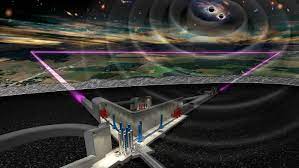Italy bolsters its bid to build Europe’s next-gen “telescope”

Rome: This week, the Italian government indicated the territory of Lula (province of Nuoro) on the Tyrrhenian island as the ideal place to host the Einstein Telescope – a third-generation gravitational wave detector, capable of “observing” signals from the cosmos to shed light on the unresolved questions of cosmology, such as black holes to dark matter, all the way back to the Big Bang.
The project, worth €1.9 billion over nine years, will be funded by the European Commission and create an estimated 36,000 jobs to build the underground facility. Construction is slated to start in 2027.
The nitty-gritty.
The Einstein Telescope will build on the success of other detectors based on laser interferometer technology, such as VIRGO (near Pisa, in Tuscany) and LIGO (in two areas of the United States), whose discoveries of black holes and neutron stars have opened a new era in the study of astronomical gravitational waves.
The size of the interferometer arm will span up to ten kilometres, compared to VIRGO’s three.

The telescope will implement several cutting-edge technologies, including a cryogenic system to cool the main optics, new quantum technologies to reduce light fluctuations, and a series of infrastructural and active noise mitigation measures to reduce environmental disturbances.
It will also work alongside a new generation of electromagnetic observatories elsewhere in the world, covering the rest of the electromagnetic spectrum, from radio to gamma rays.
Why Sardinia? The island is one of the least seismic areas in the world, with virtually no interference to disturb the highly-sensitive instrument. Also, a pre-existing underground mine would facilitate the construction of the site (the local rock is particularly solid and stable, allowing for safe construction) and the presence of underground water can mitigate seepage or seismic noise.
All these factors, according to Italy, make it more suitable than the Netherlands’ competing bid.
The Italian candidacy. Rome officially submitted its application in September 2022 with a letter from then-PM Mario Draghi to the President of the National Institute of Nuclear Physics (INFN), Antonio Zoccoli, in which he confirmed the government supported building the Einstein Telescope in Sardinia.
The region itself has pledged €350 million to support its construction, while the Ministry for the South and Territorial Cohesion would support the research infrastructure using resources from the EU’s 2021-2027 Development and Cohesion Fund. Further resources can be found within the state budget.





